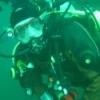
Sidemounting...what is it? Who does it?
#31

Posted 29 March 2011 - 12:19 PM
Being an engineer I tend to think that I should maintain my gear, convince myself it is safe by inspection, and not worry about it but that is just me.
#32

Posted 29 March 2011 - 12:26 PM
Contact me directly at Kamala@SingleDivers.com for your private or group travel needs or 864-557-6079 AND don't miss SD's 2018-2021 Trips! ....here! Most are once in a lifetime opportunities...don't miss the chance to go!!
SD LEGACY/OLD/MANUAL Forms & Documents.... here !
Click here TO PAY for Merchandise, Membership, or Travel
"Imitation is the sincerest flattery." - Gandhi
"Imitation is proof that originality is rare." - ScubaHawk
SingleDivers.com...often imitated...never duplicated!
Kamala Shadduck c/o SingleDivers.com LLC
2234 North Federal Hwy, #1010 Boca Raton, FL 33431
formerly...
710 Dive Buddy Lane; Salem, SC 29676
864-557-6079 tel/celfone/office or tollfree fax 888-480-0906
#33

Posted 29 March 2011 - 12:34 PM
If you have doubles on your back (with a manifold) and you have tanks at your side, they are called stage bottles. Stage bottles clip onto your chest and waist D-rings. As I understand it, you cannot sidemount and wear doubles at the same time as they require different gear configs. You may be able to sidemount and carry additional stages if the D-rings are accessible. Not 100% sure about that part.
Nice background article here.
Best Fishes.
Tech Support - The hard we do right away; the impossible takes us a little longer...
"I like ponies on no-stop diving. They convert "ARGH!! I'M GOING TO DIE" into a mere annoyance." ~Nigel Hewitt
#34

Posted 29 March 2011 - 06:46 PM
I would be quite surprised if anyone from TDI were to recommend strongly against the use of manifolds.in absolute terms. Probably he was just trying to reassure you that there's more than one way of doing most things and that if one aspect really worries you there's probably a way around it. Certainly when I was an active IANTD instructor the use of a manifolded twinset was mandatory on all but the lowest level of technical diving. I can't believe they've dropped that requirement, and I'm pretty sure that TDI would follow the same rule. But obviously that only applies when a twinset is appropriate for the dive, which of course it isn't when sidemount techniques are being employed.
But I don't see why you're worried about manifolds. What failures of manifolds have you heard about?
He didn't say "Don't use them" it was more along the lines of "given you're apprehension about them, sidemount is probably the better option".
I freely admit, I have not come across any concrete reports of a manifold failing. I may have hit something a few months back, but something about it seemed fishy so I disregarded it.
I did not know manifolds were required by most Tech agencies, though I figured they were often employed.
I challenge manifolds for two main reasons:
1. it is a single point of failure in an otherwise entirely redundant system. No way around that. I feel that having a single point of failure, weakens the entire system by potentially negating the other redundancies you've taken.
2. when you dive, you place your life in the hands of your gear. Now I love my gear, and I do trust it with my life, but I also have it serviced regularly and I keep an eye out for something that is malfunctioning.
I'm sure there is a lot of empirical evidence for the safety manifolds provide; if they were not safe, they wouldn't be employed. However, i'd consider it foolhardy to blindly follow a methodology (even a well researched one) without considering all of its pros and cons. Thus, when I thought about it, I realized that a failure in the right portion of the manifold could cause total loss of gas.
Now, I currently cannot conceive of a scenario of manifold failure that is not due to operator error (ie. breaking on a cave ceiling/inside a wreck). I say this, because I believe that I began this discussion rather poorly. Rather then denying manifolds as a useful piece of safety equipment (which they clearly are), I should have begun with a more open minded approach.
That being said if it is a choice between a potential catastrophic failure, even if its my fault, from which I cannot recover from on my own or risking more likely but recoverable problems from independent/sidemounted doubles. I'd rather pick the doubles.
I'll note that having to switch regs every few hundred psi in order to maintain balance is inconvenient at best, and I can see that it would be easy to grab the wrong reg on accident. Yet, in my opinion (you're welcome to disagree), a little added inconvenience from switching regs is worth the (perhaps perceived) safety margin of diving independent doubles. Additionally by switching regs, every what? 5-10 minutes?, you have constant reassurance that both your regs are functioning correctly. On a manifold, you won't have that if you just breath the one throughout the dive (though that is probably considered poor dive technique).
As for picking the wrong reg (and thus the wrong gas), that is clear operator error. Not saying it doesn't happen (and not saying I won't make the same mistake), but if all you need to do to prevent it is mark your reg's then I think you really have little excuse. Your >40% O2 regs are green (I think most all deco gas is >40%, correct me if i'm wrong). Your primary's are usually black or some other non-green color so there is a clear difference. Even if your travel gas uses the same reg as your bottom gas, all it takes is $.02 of duct tape on the hose to denote what one to not use on the bottom.
At this point I'll reiterate that I'm not a tech diver, so I am speculating a bit. But I'd rather be more vigilant with my equipment by alternating regs, and checking that it's the correct reg, than potentially compromise an otherwise perfectly redundant setup.
Not trying to step on anyones toes, but I think my argument is at least a valid one worth considering.
As an aside, as Peter pointed out, this does digress a fair amount from actual sidemount techniques. Is there a way to merge this into a a thread where it belongs? or perhaps start a new thread entirely?
#35

Posted 30 March 2011 - 09:01 AM
Now to comment on manifold vs. independent doubles aka side mount. Of all the reasons to NOT choose doubles...the manifold is the least of the worries/issues. As stated before the statistical number of manifold failures makes this point weaker than many of the other arguements for diving independent doubles aka sidemount vs diving traditional banded doubles. Namely, inability for many divers to develop the flexibility to do valve drills, (this refers to when you reach behind your head and turn your tanks on and off) as well as inability under STRESS to reach the valves when you've had a catastrophic failure. The weight of the tanks is a growing issue for many divers as we age...so getting up onto a rocking boat is not only difficult but can be dangerous in doubles for many people. The tendency to feel that training months and years ago will take over when practice has not been a regular part of your routine. Sidemount will be more forgiving than doubles.
The biggest drawback to side mount or independent doubles is gas switching both to keep the tanks balanced AND to make regular gas switches if diving mixed gases. If you are TRULY planning deep deep technical dives BACK MOUNTING your primary gas is probably the best choice since you will HAVE to have a number of tanks on your side IN ADDITION TO THE TWO ON YOUR BACK. There are only so many tanks you can sidemount so you will have to make some tradeoffs.
Regarding gas switching errors...the biggest error is NOT switching to the wrong gas but rather forgetting to switch your computer over. THIS can be remedied by using the Cochran which is the only military hardened/approved dive computer since it will do your gas switches for you based on depth or time. YOU tell it when to switch and so it will do it for you which eliminates the biggest diver error concern...changing the computer over...not the gas.
The only other real issue for sidemount is keeping the tanks balanced but as your SAC rate improves this is less and less of an issue. You will be able to go longer and longer before needing to chg regs to keep your tanks balanced.
Contact me directly at Kamala@SingleDivers.com for your private or group travel needs or 864-557-6079 AND don't miss SD's 2018-2021 Trips! ....here! Most are once in a lifetime opportunities...don't miss the chance to go!!
SD LEGACY/OLD/MANUAL Forms & Documents.... here !
Click here TO PAY for Merchandise, Membership, or Travel
"Imitation is the sincerest flattery." - Gandhi
"Imitation is proof that originality is rare." - ScubaHawk
SingleDivers.com...often imitated...never duplicated!
Kamala Shadduck c/o SingleDivers.com LLC
2234 North Federal Hwy, #1010 Boca Raton, FL 33431
formerly...
710 Dive Buddy Lane; Salem, SC 29676
864-557-6079 tel/celfone/office or tollfree fax 888-480-0906
#36

Posted 30 March 2011 - 09:17 AM
1. Slightly less equipment...for example one extra spg vs a manifold.
2. Easier to travel with...cloth bands for side mount vs metal bands that have to sized to the tanks you are diving. What this means is you can carry your side mount bands with you when you travel and they weight hardly nothing. Metal bands to keep the tanks together are bulky and difficult to travel with but also expensive to rent IF you can rent them at all.
3. Doubles are NOT usually available when you travel outside of the US and if they are they are VERY Expensive to rent.
4. If you can rent doubles you will have to rent double alum 80's AND pay more for less. Side mounting involves the use of a 2nd alum 80 as far as the resort is concerned so no extra hassle to get on and off the boat, no hassle for filling tanks, no extra cost to you for use of gear on an island at ISLAND PRICING.
5. Sidemount takes significantly less training to use than doubles.
6. Sidemount gear travels easily and weighs much less than doubles' gear if you travel with the manifold and bands.
7. Sidemount allows someone who needs more air/gas than an alum 80 to have a safer and easier option of getting this add'l air/gas.
8. Sidemount is cheaper than doubles.
9. Sidemount will allow you to hand up your tanks to the boat allowing you to get back on in rough seas with only your bc/harness on.
10. Sidemount will allow you to have 100% redundancy in your gear configuration and notice a problem immediately and FIX the problem immediately and easily!
I'm sure there are other advantages and we should add to this list as appropriate. We should also create a list of sidemount disadvantages and the pros and cons of backmounted doubles too!
Contact me directly at Kamala@SingleDivers.com for your private or group travel needs or 864-557-6079 AND don't miss SD's 2018-2021 Trips! ....here! Most are once in a lifetime opportunities...don't miss the chance to go!!
SD LEGACY/OLD/MANUAL Forms & Documents.... here !
Click here TO PAY for Merchandise, Membership, or Travel
"Imitation is the sincerest flattery." - Gandhi
"Imitation is proof that originality is rare." - ScubaHawk
SingleDivers.com...often imitated...never duplicated!
Kamala Shadduck c/o SingleDivers.com LLC
2234 North Federal Hwy, #1010 Boca Raton, FL 33431
formerly...
710 Dive Buddy Lane; Salem, SC 29676
864-557-6079 tel/celfone/office or tollfree fax 888-480-0906
0 user(s) are reading this topic
0 members, 0 guests, 0 anonymous users













